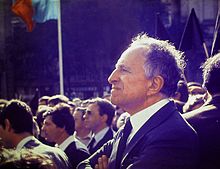Vasco Gonçalves
|
Vasco Gonçalves OA |
|
|---|---|
 |
|
| 103rd Prime Minister of Portugal | |
|
In office 18 July 1974 – 19 September 1975 |
|
| President |
António de Spínola Francisco da Costa Gomes |
| Deputy | José Teixeira Ribeiro António Arnão Metelo |
| Preceded by | Adelino da Palma Carlos |
| Succeeded by | José Pinheiro de Azevedo |
| Minister of Education and Culture | |
|
In office 29 November 1974 – 4 December 1974 |
|
| Preceded by | Vitorino Magalhães Godinho |
| Succeeded by | Manuel Rodrigues Carvalho |
| Personal details | |
| Born |
Vasco dos Santos Gonçalves 3 May 1921 Lisbon, Portugal |
| Died | 11 June 2005 (aged 84) Almancil, Portugal |
| Political party | Independent |
| Spouse(s) | Aida Rocha Afonso |
| Children | 1 daughter and 1 son |
| Alma mater | Portuguese Military Academy |
| Profession | Army officer |
| Awards |
Order of Aviz Order Playa Girón |
| Military service | |
| Service/branch | Portuguese Army |
| Years of service | 1942–1975 |
| Rank | General |
General Vasco dos Santos Gonçalves OA (Portuguese pronunciation: [ˈvaʃku ɡõˈsaɫvɨʃ]; Lisbon 3 May 1921 – 11 June 2005) was a Portuguese army officer in the Engineering Corps who took part in the Carnation Revolution and later served as the 104th Prime Minister from 18 July 1974 to 19 September 1975.
Vasco dos Santos Gonçalves was born on May 3 1921, in Sintra, Portugal. His father, Vítor Candido Gonçalves, was a professional footballer turned foreign exchange dealer. He graduated from the Portuguese military academy as an engineer in 1942. Gonçalves married, in 1950, Aida Rocha Alfonso, with whom he had a son and a daughter.
In 1973, Gonçalves joined the Armed Forces Movement and was involved in the planning of the overthrow of the Estado Novo regime.
Gonçalves short tenure as Prime Minister of Portugal was marked by political turmoil and instability. As prime minister, Gonçalves oversaw the transition of the Portugal into a democracy known as the Processo Revolucionário Em Curso or the Ongoing Revolutionary Process. Gonçalves leadership was challenged early in March 1975 during a right wing coup d'état which ultimately failed. As prime minister, the Portuguese government nationalized all Portuguese-owned capital in the banking, insurance, petrochemical, fertilizer, tobacco, cement, and wood pulp sectors of the economy, as well as the Portuguese iron and steel company, major breweries, large shipping lines, most public transport, two of the three principal shipyards, core companies of the Companhia União Fabril (CUF) conglomerate, radio and TV networks (except that of the Roman Catholic Church), and important companies in the glass, mining, fishing, and agricultural sectors. Because of the key role of the domestic banks as holders of stock, the government indirectly acquired equity positions in hundreds of other firms. An Institute for State Participation was created to deal with the many disparate and often tiny enterprises in which the state had thus obtained a majority shareholding. Another 300 small to medium enterprises came under public management as the government "intervened" to rescue them from bankruptcy following their takeover by workers or abandonment by management. Several high-profile entrepreneurs had to leave the country due to the pro-communist radicalism of both a section of the population and the new revolutionary leadership in charge of the government - the Junta de Salvação Nacional (National Salvation Junta).
...
Wikipedia
